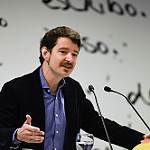The social platform for learning is changing

‘Karen McCoy’ from the International Baccalaureate Organization (IB Global Centre) interviewed me a few days ago, here its transcription.
Question 1: Could you tell us a little more about your key ideas?
Lately, I’ve been focusing on three key ideas in education.
- First of all, moving more into context rather than content. Proper context will stimulate different synapses and connections between people.
- Secondly, I have really been inspired by the work done by George Siemens. The value of information is changing in a dramatic way and has a different flavour than when we tried to access knowledge 20 years ago. This network of knowledge challenges the structure of learning.
- Last but not least, the idea of entrepreneurial driven initiatives within schools. This can be socially driven and creates new business.
Question 2: Who have been the key educational thinkers who have influenced your own thinking on teaching and learning?
- John Seely Brown is a senior promoter of innovation. He originally comes from the industry world, but switched to new forms of learning. His work brings up challenges in thinking about knowledge.
- Larry Cuban is a researcher and academic from the Stanford University. His contributions are on the incorporation of technology in classroom. He gives a thought provoking critical voice to the matter.
- Neil Selwyn has a comprehensive approach on how knowledge has been brought into the classroom and addresses failures that have been replicated systematically.
- George Siemens and his ideas on connectivism. I was a little suspicious of connectivism, I think it’s challenging, but it has lots to do with the amount of information that kids have to deal with these days.
- Ivan Illich gives harsh criticism to school, but is a thought provoking read on highlighting the combination of formal and informal education.
Question 3: If you could recommend one book for our Diploma Programme teachers to read, what would it be and why?
I would recommend the book Knowmad Society. ( Moravec . J. 2013. Knowmad Society. Education Futures LLC) It focuses on one of the key ideas I mentioned in the previous question – integrating entrepreneurship initiatives in formal education. It focuses on the idea of knowledge workers by Peter Drucker and talks about permanent flowing not only in terms of territory but flowing in terms of knowledge and highlighting the relevance of resilience and adaptability in students. It is linked to “Flat World” knowledge by Friedman.
Question 4: What do you think is the biggest difference between education today and education 30 years ago?
My criticism would be that we are increasingly more obsessed with assessment. Every time we want to explore potential innovation in the classroom, the concern that we will fail in national and institutional assessment comes up. Innovation suffers because of concern we may fail.
Positively, we are beginning to open the door from formal venues of learning into informal learning venues and the hybrid approach to learning. By hybrid I mean formal and informal, individual and collective, and online and offline.
Question 5: What do you think is the biggest challenge facing teachers today? What do you think is the biggest challenge facing students today?
Teachers are knowledge workers or “knowmads”. Knowledge is becoming a commodity, and if you have the proper switch activated then you will always find valuable knowledge to be learned from.
The challenge is how to deal with information that is always changing. Knowledge is liquid – it is always going to be moulded or reshaped. For example, we use books but updating them is not the fastest way to update our learners. The analysis of how difficult it is to update contents in comparison of how knowledge flows means finding other currencies and recognizing teachers that are doing good stuff in assessing.
As for students, the world is complex and no one understands well where we are going. We tend to talk about the future because we don’t know what is going on in the present. This puts a lot of pressure on our students, because we have no idea which direction they need to go. They need to decide early on different strategies and mechanisms beyond formal education. They need to know that what they get from school is not going to be enough – that grades will not be enough. Students have to be their own engineers of their own learning path, to dedicate as much time as possible in laboratories of innovation out of school and within school, to embrace social entrepreneurship initiatives, and to promote ideas of lifelong learning.
Look at the “geek” community and the way they collaborate on the internet. Their collaboration is based on “digital badges” (flexible competence-based systems), as a way to recognize the achievements of others within the community. There is an increasing agreement that the social platform for learning is changing.
Posted in Research on Jun 16, 2014




